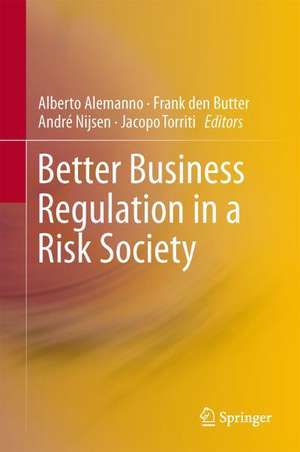Better Business Regulation in a Risk Society
Editat de Alberto Alemanno, Frank den Butter, André Nijsen, Jacopo Torritien Limba Engleză Hardback – 14 sep 2012
| Toate formatele și edițiile | Preț | Express |
|---|---|---|
| Paperback (1) | 642.36 lei 6-8 săpt. | |
| Springer – 15 oct 2014 | 642.36 lei 6-8 săpt. | |
| Hardback (1) | 645.79 lei 6-8 săpt. | |
| Springer – 14 sep 2012 | 645.79 lei 6-8 săpt. |
Preț: 645.79 lei
Preț vechi: 759.76 lei
-15% Nou
Puncte Express: 969
Preț estimativ în valută:
123.58€ • 129.94$ • 102.11£
123.58€ • 129.94$ • 102.11£
Carte tipărită la comandă
Livrare economică 17 aprilie-01 mai
Preluare comenzi: 021 569.72.76
Specificații
ISBN-13: 9781461444053
ISBN-10: 1461444055
Pagini: 336
Ilustrații: VIII, 328 p.
Dimensiuni: 155 x 235 x 22 mm
Greutate: 0.57 kg
Ediția:2013
Editura: Springer
Colecția Springer
Locul publicării:New York, NY, United States
ISBN-10: 1461444055
Pagini: 336
Ilustrații: VIII, 328 p.
Dimensiuni: 155 x 235 x 22 mm
Greutate: 0.57 kg
Ediția:2013
Editura: Springer
Colecția Springer
Locul publicării:New York, NY, United States
Public țintă
ResearchTextul de pe ultima copertă
The premise of this volume is that business regulations are expected to grow in the near future as a consequence of the emergence of a “(world) risk society.” Risks related to terrorism, climate change, and financial crises, for example, will penetrate all conditions of life. Increasingly, the decisions and actions of some bring about risks for many in this era of globalization. Controlling these risks implies managing the world through high-quality regulation, with a particular emphasis on businesses and financial institutions. Central to this approach is the argument that a major, if not the primary, aim of regulation is to internalize externalities, or in a broader context, to repair market failure. Such repair can only be accomplished when the costs are smaller than the welfare gains.
Featuring contributions from researchers and policy analysts from the fields of economics, management, law, sociology, political science, and environmental policy, this book focuses on three major topics:
Social risks and business regulation
Preconditions for better business regulation
Theoretical issues related to better business regulation
Collectively, the authors demonstrate that the easier it is for regulated businesses to comply at the lowest costs possible—without jeopardizing the related public goals—the greater the degree of compliance. When successful, the net result is a balance of individual and collective net benefits, and by further implication, sustainable business practice and economic growth.
Featuring contributions from researchers and policy analysts from the fields of economics, management, law, sociology, political science, and environmental policy, this book focuses on three major topics:
Social risks and business regulation
Preconditions for better business regulation
Theoretical issues related to better business regulation
Collectively, the authors demonstrate that the easier it is for regulated businesses to comply at the lowest costs possible—without jeopardizing the related public goals—the greater the degree of compliance. When successful, the net result is a balance of individual and collective net benefits, and by further implication, sustainable business practice and economic growth.
Caracteristici
Utilizes public economics theory to analyze the costs and benefits of business regulation Features case studies in climate change, agro-business, financial services, and environmental policy Consider practical and policymaking implications
















